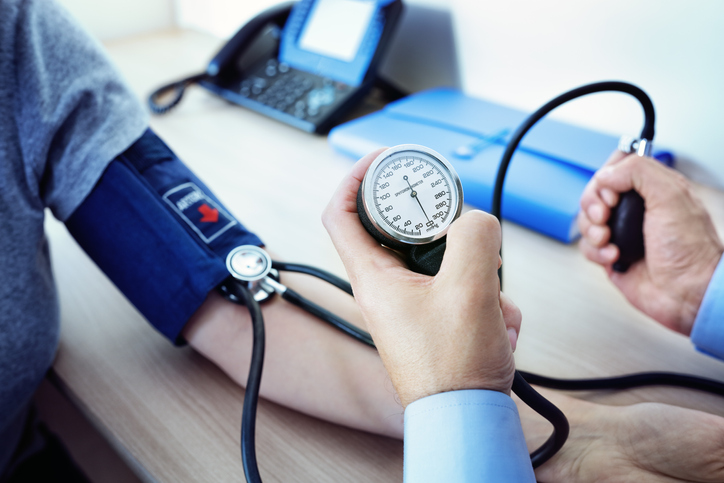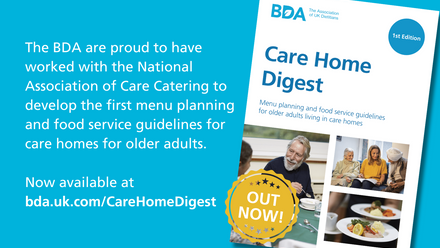This fact sheet will tell you about simple changes you can make to your diet to help reduce the health risks that having high blood pressure can cause.
What is high blood pressure?
High blood pressure (or hypertension) means your blood pressure is consistently too high and your heart has to work harder to pump blood around your body. There are usually no symptoms but if left untreated, it increases your risk of heart attacks and stroke, as well as kidney and eye damage. That’s why it’s so important to get your blood pressure checked regularly.

High blood pressure is very common in the UK, affecting around one in four adults. The older people get, the risk of developing it increases because blood vessels don’t stretch as well. There is nothing you can do to stop your body ageing, but there are plenty of lifestyle changes you can make to help control your blood pressure.
How can you lower your blood pressure with diet?
1. Cut down on salt
People who have a lot of salt in their diet are more likely to have high blood pressure. Adults should have no more than six grams of salt a day – about one teaspoon. It is the sodium in salt that contributes to high blood pressure, and it is present in all types of salt including sea salt, flakes, crystals and flavoured salt.
Reducing the amount of salt you add to your food, as well as the number of ready meals and takeaways you eat will help. Some people might opt for a salt substitute, made from potassium chloride. It can be useful for eating less sodium, but it won’t help you get used to a less salty taste. They are also not suitable for everyone, for example those with kidney problems, heart failure and if you take certain blood pressure-lowering medication. Check with your doctor before using them.
2. Drink less alcohol
Drinking more than the recommended amount of alcohol can cause high blood pressure and damage to your heart muscle.
If you drink alcohol, it is important to keep within the UK guidelines.
3. Eat a healthy diet
A balanced diet that includes foods high in potassium, magnesium, calcium and fibre will help to lower blood pressure.
- Fruit and vegetables are rich in potassium, magnesium and fibre. Aim to eat at least five portions per day. Fresh, frozen, dried, juiced and canned all count. If you are using canned varieties, look for those with lower salt and sugar.
- Dairy foods are good sources of calcium. Opt for lower fat versions such as semi skimmed milk, low-fat yoghurts and low-fat cheese. Include two to three servings per day.
- Wholegrain foods like wholegrain breakfast cereals and breads, brown pasta and rice and oats are high in fibre, potassium and magnesium. Aim for two to three servings per day.
- Oily fish are rich in omega-3 fatty acids, which have been shown to have some effect on reducing blood pressure. Aim for at least one portion of something like salmon, pilchards, sardines, mackerel, herring or trout per week.
- Dietary supplements such as calcium, magnesium and potassium are not recommended for reducing blood pressure, as consuming more than you need can be harmful. Talk to your doctor if you are thinking about taking a supplement.
What other changes can lower blood pressure?
Keep a healthy weight
There is a strong link between high blood pressure and having excess weight. This is especially true if you carry weight around your waist.
Losing weight (even as little as 5-10% of your starting weight) will help. Slow and steady weight loss (about 1-2 lbs/0.5-1kg per week) is a healthy way to lose weight and gives you a better chance of keeping the weight off.
Move more
Being physically active and taking regular exercise helps to reduce your blood pressure by keeping your heart and blood vessels in good condition and also help with weight loss.
Try to build more physical activity into your daily routine by aiming for at least 150 minutes (2 ½ hours) of moderate intensity activity across a week. This means any activity that makes you feel warmer, breathe harder and makes your heart beat faster than usual. Speak with your doctor if you have heart problems or are new to exercise.
Have less caffeine
Drinking a lot of caffeine, like coffee, tea and cola drinks may increase your blood pressure.
Manage your stress levels
Getting enough sleep, learning relaxation techniques or asking for help, as well as eating a healthy diet, may all help. Feeling stressed can raise blood pressure for a short time, which is normal. However, behaviours linked to stress like overeating, eating too much salt, drinking too much alcohol and not being active enough can lead to long term high blood pressure.
Top tips
- Cutting down on salt, keeping to the recommended amount of alcohol, eating a diet rich in essential minerals, keeping a healthy weight and being more physically active will all help to lower blood pressure.
- Make sure you have at least 5 portions of fruit and vegetables a day and two or three servings of low-fat dairy foods and wholegrains. Try to have one portion of oily fish each week.
- Maintain a healthy weight and exercise - keeping your heart healthy!
- Limit alcohol consumption
- Ensure you are managing your stress levels - behaviours as a result of stress are likely to lead to high blood pressure.
Source(s)
- Practice-based Evidence in Nutrition Cardiovascular Disease – Hypertension [online] available by subscription from http://www.pennutrition.com/KnowledgePathway.aspx?kpid=674&trid=19480&trcatid=27 [Last accessed 20.02.2023]
- National Institute for Health and Clinical Excellence (2022) CG136 - Hypertension in Adults: diagnosis and management [Online] available from https://www.nice.org.uk/guidance/ [last accessed 20.02.2023]
- Scientific Advisory Committee on Nutrition and Health. Salt and Health. London: TSO; 2003.
- He FJ, Macgregor GA. How far should salt intakes be reduced? Hypertension. 2009;42:1093– 1099.
- Hooper L, Bartlett C, Davey Smith G, et al. Advice to reduce dietary salt for prevention of cardiovascular disease. Cochrane Database Syst Rev. 2004;(1):CD003656.
- Whelton PK, Appel LJ, Espeland MA, et al. for the TONE Collaborative Research Group. Sodium reduction and weight loss in the treatment of hypertension in older persons: a randomized controlled trial of nonpharmacologic interventions in the elderly (TONE).JAMA. 1998;279:839–846.
- NICE. Hypertension: Management of Hypertension in Adults in Primary Care. Online. Available at: http://www.nice.org.uk/CG34. 45. American Heart Association scientific statement. Dietary approaches to prevent and treat hypertension. Hypertension. 2006;47:296–308.
- Appel LJ, Moore TJ, Obarzanek E et al. A clinical trial of the effects of dietary patterns on blood pressure.N Engl J Med. 1997;336:1117–1124.
- Sacks FM, Svetkey LP, Vollmer WM, et al. Effects on blood pressure of reduced dietary sodium and the dietary approaches to stop hypertension (DASH) diet. DASH Sodium collaborative Research Group. N Engl J Med.2001;344:3–10.
- Kapil v, Milsom AB, Okorie M, et al. Inorganic Nitrate Supplementation lowers blood pressure in humans. Role for nitrite-derived NO. Hypertension. 2010 Aug;56(2):274-81.
- Webb AJ, Patel N, Loukogeorgakis S,et al. Acute blood pressure lowering, vasoprotective, and antiplatelet properties of dietary nitrate via bioconversion to nitrite. Hypertension. 2008;51:784–790







